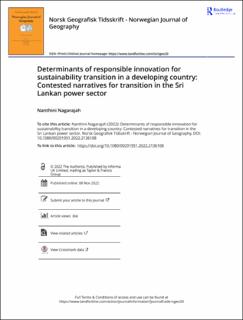Determinants of responsible innovation for sustainability transition in a developing country: Contested narratives for transition in the Sri Lankan power sector
Peer reviewed, Journal article
Published version
Permanent lenke
https://hdl.handle.net/11250/3062061Utgivelsesdato
2022Metadata
Vis full innførselSamlinger
Sammendrag
Global efforts towards sustainable energy transition remain uneven. Developing countries are embedded in a vulnerable setting requiring rapid but responsible action to meet increasing energy demands due to their specific projected economic and population growth. Consequently, such countries have addressed the challenges of achieving sustainable energy transition differently compared with developed countries with regard to renewable energy development and its governance. Theories of sustainability transition and responsible innovation (RI) have their origin in developed countries, and the application of this Western-centric version has been found incompatible with the contexts of developing countries. The aim of the paper is to explore how contextual understandings of RI are discursively constructed and how such understandings enable or constrain sustainable energy pathways in developing countries. The author draws on empirical evidence relating to the power sector in Sri Lanka and analyses three narratives in play revealed by a qualitative case study. The findings indicate that developing countries must place greater emphasis on aligning technological innovation systems with RI in efforts to achieve sustainability transitions by being vigilant with regard to contextual narratives on RI. The author concludes that prevalent narratives should be regarded as a bridge for linking sustainability transitions to RI.

